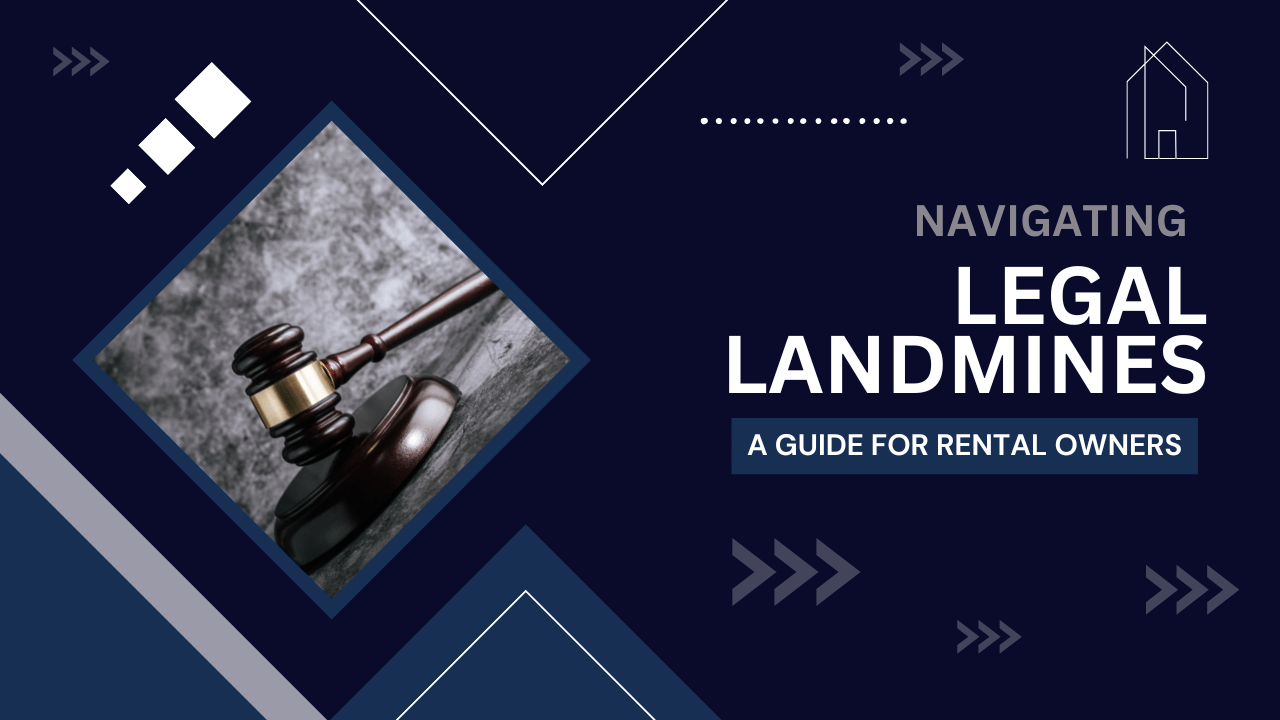It’s easy to make a legal mistake when you’re renting out a home, especially in California. We are a state known for its tenant protections and its strict rules around rent control, eviction, security deposits, and tenant privacy. There are lists of disclosure that must be included in every lease agreement, and habitability standards are enforced in rental properties more than ever before.
There are some legal landmines that you want to avoid when you’re renting out your home, and that’s why Bell Properties always recommends that you work with a professional property manager. You could potentially manage a home on your own anywhere else in the country, almost. But in California, you want to make sure that someone with a lot of experience and a deep understanding of the current and coming laws is in place to keep you and your rental property compliant.
Mistakes are expensive. A fair housing mishap, for example, could force you to face a $16,000 fine.
Here’s Bell Properties’ guide to rental owners in Los Angeles and across California on how to avoid those legal problems and stay on the right side of the state’s strict rental laws.
Fair Housing Laws in California
Fair housing laws seem pretty simple to follow, but a lot of landlords and property owners find themselves tripping over language and perception. You probably think you would never discriminate against a tenant intentionally. We believe you. However, the words you use in your marketing materials can be perceived as discriminatory. It’s important to be careful and it’s absolutely critical to focus your listings on the property itself and what it has to offer – not what kind of tenants the home would be perfect for.
You’ll also be interested to know that California fair housing laws are stricter than the federal fair housing laws. We have more protected classes. When renting out a home in Los Angeles, you cannot discriminate based on:
Race
Color
National Origin
Religion
Sex
Familial status
Disability
Age
Ancestry
Citizenship
Gender identity and gender expression
Genetic information
Immigration status
Marital status
Primary language
Sexual orientation
Source of income
You cannot discriminate arbitrarily either, for example, against or in favor of veterans or specific occupations.
While some laws in California come with exemptions, the fair housing laws have no such exemptions. Unless you own and occupy a single-family home and rent part of it out to a tenant, you need to follow these fair housing laws and you need to make sure you’re treating every applicant and tenant consistently.
Before you list a home for rent or screen a tenant, make sure you understand the laws that protect those tenants. Your marketing materials should not say “perfect for families” or “close to churches.” Your screening criteria cannot disqualify Section 8 applicants because those housing vouchers can be counted as income, and source of income is not a legal reason to deny a tenant.
There are lots of legal landmines when we talk about fair housing on its own. Consult a Los Angeles property manager before you make any decisions so you can be sure you’re not putting yourself at risk.
Rent Control and Just Cause Eviction
The Tenant Protection Act of 2019 went into effect in 2020, and brought statewide rent control to California. It also delivered some conditions under which landlords can legally evict a tenant.
Some properties are exempt. Single-family homes, for example, do not have to follow these laws unless they’re owned by a corporation. However, if you’re exempt from the law’s rent control and just cause eviction provisions, you’ll need to have language in your lease agreement that reflects the exemption. The law WILL apply to you if your lease does not reflect that you aren’t a property subject to the rent control provisions set forth in the Tenant Protection Act.
Rental increases in California can be a legal landline, thanks to the local and statewide restrictions on how much you can increase your rent. Bell Properties recommends that whether you’re covered by the state law, the local laws, or even exempt from all laws, you never raise your rent more than 10 percent. Usually, your limits will be lower than that if your property is covered by rent control laws.
According to the rent control restrictions in the Tenant Protection Act, you can increase rent once in a 12-month period, and that’s usually going to occur during the lease renewal. At that time, you can increase your rent by five percent plus whatever the Consumer Pricing Index (CPI) is. The Los Angeles CPI will be released in mid-October, and it measures the average change in prices over time in a fixed market.
To make things more complicated when it comes to raising rent, California has a law that says rent cannot be raised more than 10 percent regardless of whether you’re included or exempt from rent control laws when there’s a state of emergency in place. We often have a state of emergency in California due to fires, droughts, and other disasters. COVID inspired a state of emergency for several years.
Don’t raise your rent more than 10 percent if you’re not covered by rent control laws. You have to give extra notice periods, and you’ll likely lose your tenants. Study the market and make sure you’re raising your rent in accordance with rent control laws and with what competing properties are renting for.
Just cause eviction laws allow you to evict a tenant without penalty for a number of specific reasons. The most common reason you’ll evict is nonpayment of rent. Additionally, some rental property owners will have to evict for lease violations and criminal behavior inside the property. If your lease ends and the tenant did not renew their lease agreement but they also did not move out of the property, you’ll have a just cause to evict.
If you evict for a reason that is not the fault of the tenant; for example, you want to move into the property yourself, you’ll have to pay a relocation fee that’s equal to one month’s rent.
Eviction in California has a lot of potential problems. It’s time consuming, expensive, and full of landmines. Don’t evict a tenant without the help of a Los Angeles property manager or an experienced landlord and tenant attorney.
Security Deposit Mistakes in California
 Even experienced rental property owners and landlords find themselves stumbling through the security deposit process. There are rules around how much you collect, when you must return it, and what you can keep from the deposit and why.
Even experienced rental property owners and landlords find themselves stumbling through the security deposit process. There are rules around how much you collect, when you must return it, and what you can keep from the deposit and why.
If you don’t understand security deposit law in California, you could find yourself in some legal hot water of your own. When a tenant disputes what you’ve deducted from their deposit, for example, they can take you to court. If the judge rules in their favor, not only will you have to return the full security deposit, you’ll also have to pay punitive damages which could add up to three times the amount of that deposit.
Avoid mistakes.
Here’s what you need to know about California security deposit law:
There are limits to what you can collect. If you’re renting out a furnished property, the amount of your deposit can be up to three times the amount of one month’s rent. If you’re renting out an unfurnished property, you can collect a security deposit that is no more than two times the amount of one month’s rent.
Security deposits are always refundable.
You have 21 days to return the deposit to your tenant. After they vacate the property, you’ll want to get a forwarding address. Send the deposit to that address within 21 days of their move out.
If you keep any or all of the deposit, you must send an itemized statement explaining what was withheld and why it was withheld.
You need to offer your tenants a pre-move out inspection two weeks before they depart.
There’s often confusion around what you can deduct. Legally, rental property owners are allowed to withhold money from the security deposit to pay for damages left behind by the tenant. If there’s trash that needs to be hauled out or cleaning that needs to be done, the deposit can be used. If there is any back rent owed, the deposit can be used to bring the account current.
You cannot deduct for normal wear and tear. There is sometimes confusion about what is actually damaged and what is wear and tear. Document everything, especially the condition of your property before the tenants move in and after they move out.
Bell Properties wants to help you avoid these legal landmines and many others that pose potential risks to landlords and rental property owners in California. Don’t waste money on a legal mistake that can be prevented. Instead, make sure you understand the laws, share the expectations and responsibilities of your tenants, and create a good relationship with your renters. Work with local property managers so you don’t have to worry about missing a fair housing requirement or violating a state law that you did not understand.
We can help. Our team stays up to date on all the current laws and those that are being considered. Contact us at Bell Properties for more information.


